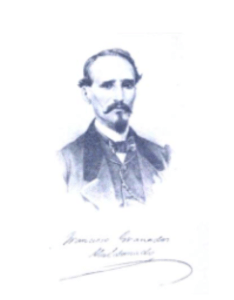Mexico
First published in 1904.
Francisco Granados Maldonado
La Zaragozaida
Francisco Granados Maldonado is, to this day, the very definition of an obscure poet. We do not know when or where he was born; according to extant registers, he died in 1872 in the city of Chilpancingo, now the capital of the state of Guerrero, in the southwest region of Mexico. Little, if anything, has emerged about his upbringing, his personal life, or his early education. Although a few of his contemporaries once claimed that he was respected by the intelligentsia of his time, it seems that Granados Maldonado was never what we might call a cultural celebrity.
His academic and intellectual achievements, however, are remarkable—he became president of the Instituto Literario del Estado de Guerrero (Literary Institute of the State of Guerrero), as well as director of the very prestigious Liceo Hidalgo (Hidalgo Lyceum), of which he was a founding member. Also a lawyer, playwright, and prolific translator, Granados Maldonado frequently contributed to reputable publications like El presente amistoso (The Friendly Gift) and La Ilustración mexicana (The Mexican Illustration), among other influential journals where the thriving culture of post-Independentist Mexico used to be thoroughly and critically reported. Unbeknownst to most, his verse translation of John Milton’s Paradise Lost (or, in Spanish, El Paraíso perdido), which the eminent printer Ignacio Cumplido published in Mexico City in 1858, is the first-ever Spanish rendering of the epic in the Hispanophone Americas.
In most of his comparatively inconspicuous works and writings, Granados Maldonado shows a wide range of cultural interests, as well as a vast knowledge of the literary traditions of Europe, both classic and modern. The poet frequently draws his readers’ attention to what might be considered one of his main intellectual concerns: the origins and evolutionary routes of epic poetry, from ancient Greece’s Homer to France’s Voltaire. It was on the great verse written in foreign tongues that Granados Maldonado, very much a polymath, cemented his creative ambitions. According to the Mexican writer, an epic poem is “la relación en verso de una empresa ilustre, difícil y memorable“ [the telling in verse of an illustrious, difficult, and memorable enterprise], and the action it presents “debe ser grandiosa, interesante y de extensión proporcionada” [must be grandiose, interesting, and of proportional extension] (La Zaragozaida, Introduction, page VII). Undoubtedly, Granados Maldonado strives to achieve such virtues in most of his own lines, which often aim at grandiloquence and rhetorical sinuosity.
The work of one epic poet in particular seems to especially stimulate Granados Maldonado’s fancy every time he discusses the subject of high-resounding verse. Despite quite frequently expressing his unbounded admiration for modern vates like Ariosto, Camoens, and Tasso, it is John Milton, the poet of Paradise Lost and Paradise Regained, who, in the mind of the Mexican writer, seems to have stricken all the right epic notes in modern times. “Si se tiene escrúpulo en llamar al Paraíso perdido poema épico” [If one should be so bold as to call Paradise Lost an epic poem], claims Granados Maldonado, “que se le llame poema divino, ó de otro modo, con tal que se conozca que es una obra tan admirable en su género como la Ilíada” [then one must call it a divine poem, or call it whatever, so long as the whole world knows it is a work as admirable in its own genre as the Iliad certainly is] (La Zaragozaida, Introduction, page VIII). In truth, the English poet and polemicist would prove to be a major influence on what can be considered Granados Maldonado’s most ambitious literary project, one through which the poet intended to articulate the idea of Mexico as a young-yet-great heroic nation in the eyes of the world during the late 19th century.
La Zaragozaida or, in rough English translation, The Zaragozaid, is comprised of twelve cantos—just like Paradise Lost—and ought to be considered Granados Maldonado’s literary summit, at least in terms of his poetical ambition and aspiration. Composed in 1866–1867 and published posthumously in 1904, the epic relates and elevates the heroic deeds of Ignacio Zaragoza, the Mexican general and politician who led the six hundred soldiers who pyrrhically defeated a much larger French army at the famous Battle of Puebla, on 5th May 1862 (hence Cinco de Mayo). “Luego, entre genios de inmortal belleza, / Viene la Religión; y la Victoria / Y la Inmortalidad á Zaragoza / Conducen, de los héroes circundado” [Then, amidst genies of immortal beauty, / Comes Religion; and Victory / And Immortality to Zaragoza / Lead forth, surrounded by heroes] sings Granados Maldonado’s voice in carefully-measured, unrhymed hendecasyllables.
What sets Granados Maldonado apart from other epic poets, in whatever language, is his direct involvement in the deeds that he narrates and poetises in La Zaragozaida. The bard himself states the following:
Como testigo ocular de los desgraciados, pero gloriosos acontecimientos que tuvieron lugar en Puebla de Zaragoza, en el heroico sitio que México sostuvo contra la invasión francesa; y ocupando una posición propia para estar al tanto de los sucesos; puedo con verdad referir esos brillantes hechos de armas que forman la epopeya de aquella época, y cuyos hechos consigno en el presente poema.
[As an eyewitness to the dismal-yet-glorious deeds that took place in Puebla de Zaragoza, at the heroic siege that Mexico withstood against the French invasion, and standing my own ground in order to record what transpired, I can truthfully recount the glowing military operations that constitute the epopee of those days, and whose occurrences I now confirm in the present poem.]
(La Zaragozaida, Introduction, page XXXII.)
Despite its high-flying objectives and skillfully-wrought structure, Granados Maldonado’s epic is not without its flaws—objective readers cannot possibly deny that many of its passages suffer from a tinge of pretension, and more than a few of the ‘heroic facts of arms’ that the narrator describes are imagistically and rhetorically overblown. And yet, Granados Maldonado’s sense of patriotic and poetic duty more than makes up for most of the work’s defects. As he himself puts it, “No creo haber dado a México su epopeya; pero si que mi humilde libro despertará entre mis compatriotas el deseo de escribir un poema verdaderamente nacional; quedándome la satisfacción de haber intentado el primero. ‘In magnis et voluisse sat est‘.” [I do not think I have given Mexico her epic poem, but I am certain that my humble book shall awaken in my fellow countrymen the wish to write a truly national poem. I am content to have tried the writing of the first one. ‘In great things, it is enough even to have willed‘.”] (La Zaragozaida, Introduction, page XXXIV.)
Mario Murgia
National Autonomous University of Mexico (UNAM)
Works Cited
Granados Maldonado, Francisco. 1904. La Zaragozaida. México: Oficina Tipográfica de la Secretaría de Fomento.
.
Resources
Edition:
Granados Maldonado, Francisco. 1904. La Zaragozaida. México: Oficina Tipográfica de la Secretaría de Fomento. First edition, available online.
Suggested reading:
Granados Maldonado, Francisco. 1858. El Paraíso perdido de John Milton. México: Imprenta de Ignacio Cumplido.
Granados Maldonado, Francisco. 1849. Melodías de la noche. México: Imprenta de las Escalerillas.
Granados Maldonado, Francisco. 1904. La Zaragozaida. México: Oficina Tipográfica de la Secretaría de Fomento.
Mantecón, José Ignacio. 1963. Una nueva versión de la “Bibliografía en México en el Siglo XIX”, del Dr. Nicolás León. México: Universidad Nacional Autónoma de México.
Martínez de la Rosa, Francisco. 1843. Poética. Tortosa: Imprenta de José Antonio Ferreres.
Bibliography supplied by Mario Murgia, National Autonomous University of Mexico (UNAM).

